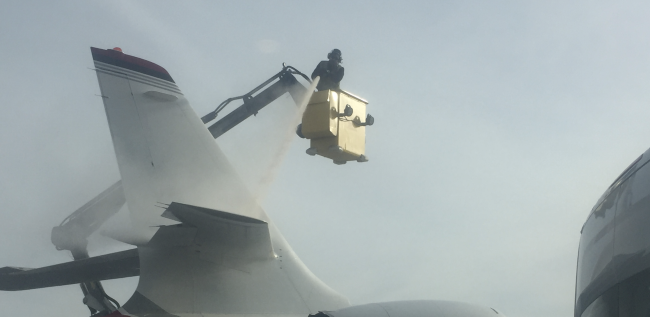

The first point to get straight is the issue is not whether or not your aircraft will need deicing. Based on the conditions, your pilots and their flight operations team will make that decision, just as it’s done when you fly with the airlines.
The surprise is usually when you look at your monthly jet card statement – or with on-demand charter – receive a post-flight charge to your credit card. If you do a lot of flying from winter weather destinations to winter weather destinations during the winter, it’s something that deserves your attention.
The other day, I talked with a subscriber who had flown with two companies that included deicing their hourly rates. I had to repeat several times that deicing is not included in several programs they were looking at. Since both of their past providers included it, even though most of their flying was winter weather flying, they were oblivious that others charge for deicing additionally.
In the Private Jet Card Comparisons‘ QUICK COMPARE spreadsheet, look to Column BH. It’s one of more than 65 variables subscribers can compare between jet card offers. Just under one-third of providers include deicing or offer deicing insurance. With some providers, it varies by program or even whether you end up on or off-fleet. In other words, it’s all about the fine print.
In the end, you still may end up going with a program that charges deicing per incidence. However, it’s something you should include in your calculations if you are doing winter weather flying.
Over the years, I’ve had some fun stories from subscribers about deicing.
One subscriber told me about how his PA asked him why he had ordered $5,000 in ice. At first blush, she thought it was a catering mistake. Then, not being sure, even before calling the provider, she figured better to ask the boss if he knew anything about it.
He quickly understood it was for deicing the aircraft. His surprise was that he was being billed for it.
Then there was a subscriber who told me he paid at least $100,000 in deicing bills. He, too, was surprised when he got his first bill. His sales rep calmly explained that deicing is done to ensure safe travel, and charging for it was standard.
It wasn’t until he subscribed to Private Jet Card Comparisons that he learned some providers include deicing.
Then, there’s the worst-case scenario for your wallet. That’s double deicing. While I’m told it is rare, I’ve had subscribers tell me it has happened to them.
What is double deicing? Let’s assume your aircraft is being repositioned from Teterboro Airport to Westchester County Airport for your flight to the Bahamas. On a winter’s day in the northeast, the aircraft could well have needed to be deiced before its repositioning flight. Just like any airliner, the wintery stop at HPN might necessitate the need for a second deicing of the day.
In other words, if deicing is not part of your contracted rate before you step out of the FBO onto the tarmac, you may have rung up between $3,000 and $20,000 in deicing bills.
How much does deicing cost?
Good question, and a hard one to answer. It varies by both sizes of aircraft and airports. The size of the aircraft impacts the amount of fluid, so fairly straightforward.
Of course, the amount of fluid used can depend on the crew doing the deicing.
Then there is the airport variable. Each airport authority has its own rules for where deicing can occur and what types of deicing products can be used. That means a deicing bill for the same aircraft type varies from one place to another.
In building our deicing expense estimate for our exclusive QUICK COMPARE FLIGHT PRICING (a favorite feature of users), we spoke to both operators and FBOs.
We came out with the following estimates:
| Cabin Size | Typical Fee |
| Turboprop | $1,500 |
| Very Light | $1,500 |
| Light | $1,500 |
| Midsize | $3,500 |
| Super Midsize | $5,000 |
| Large | $7,500 |
| Ultra Long Haul | $9,000 |
Our calculator plugs in the estimated deicing charge for programs that don’t include deicing in our deicing scenario. That way, you can get a quick idea if a program that charges extra is still price competitive with ones that do.
Of course, you can look at straight pricing as well, but we think it’s a nifty feature.
Anyway, let’s assume you make six winter weather trips where you are likely to have adverse weather on both ends. That would be 12 opportunities for a deicing bill during the course of a year’s flying.
If you needed deicing, half the time (six deicing bills) on a midsize jet, you are looking at $21,000 in deicing bills (6 x $3,500). It could be $30,000 (6 x $5,000) on a super-midsize jet, more or less.
The back of the envelope math then becomes dividing how much you might pay for deicing over the number of hours you expect to fly. Dividing $21,000 in deicing bills over 25 hours adds $840 per hour to the published rate. If you fly 50 hours, amortizing deicing equates to adding $420 per hour to your contracted rate.
So what’s the bottom line? Deicing expense becomes more of an issue if you are flying larger aircraft. But even more, if you consider a program that doesn’t include deicing, ask your provider to pull deicing bills from the airports you will be using. That way, you will be going in with your eyes wide open.